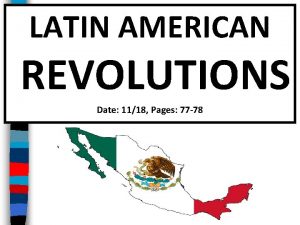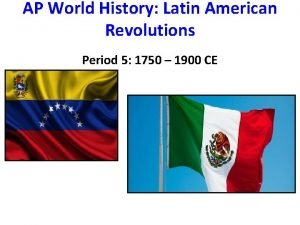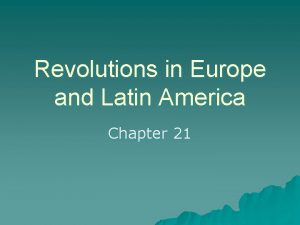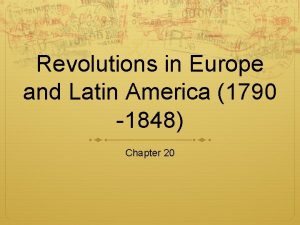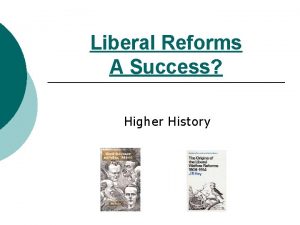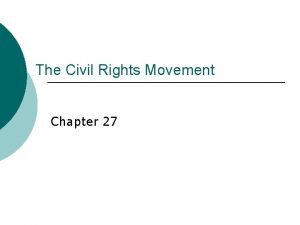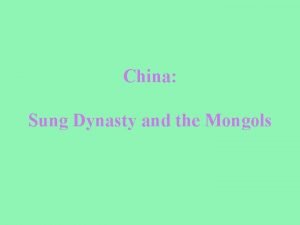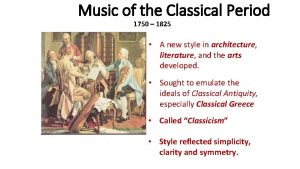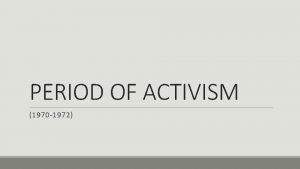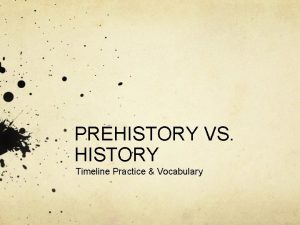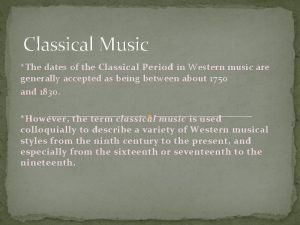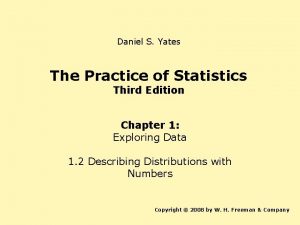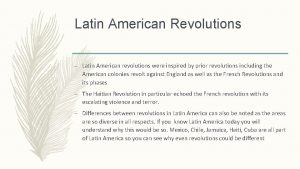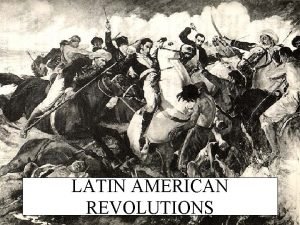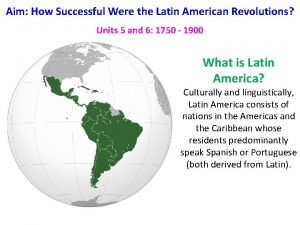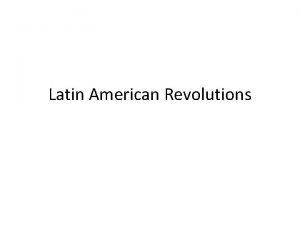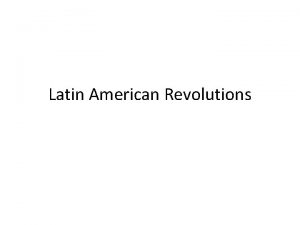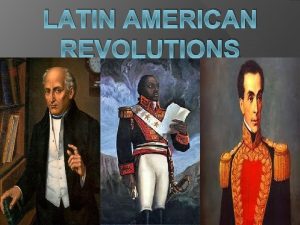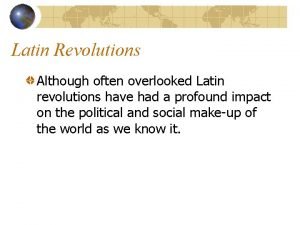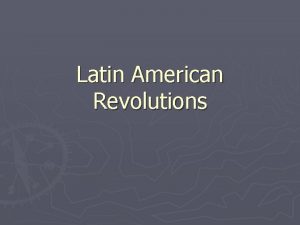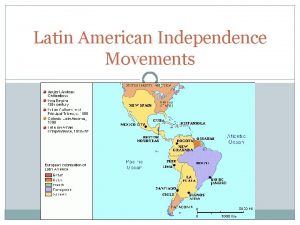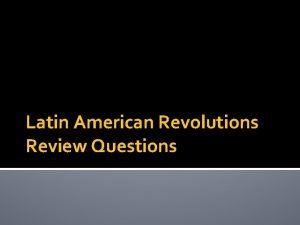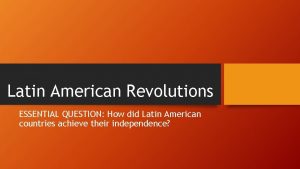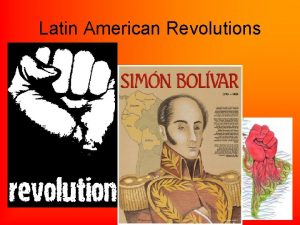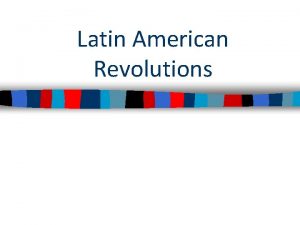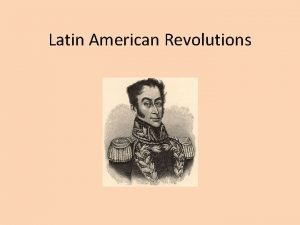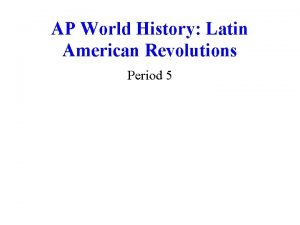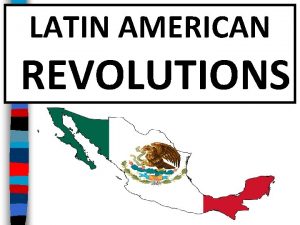Aim Were the Latin American Revolutions successful Period





















- Slides: 21

Aim: Were the Latin American Revolutions successful? Period 5: 1750 - 1900

I Causes A) Mercantilism and the encomienda system unequal social divisions B) Inspiration from the enlightenment and the recent revolutions (American, French, and Haitian) C) Creoles had wealth & education but could not participate in government


II The Revolutions A) In Mexico the Indians & mestizos played the leading role. In 1810, a poor but well educated Catholic priest, Miguel Hidalgo, called for a revolution against Spain. Hidalgo led an army of 80, 000 Indian & mestizos against the Spanish military & creoles who feared losing their wealth. Hidalgo was killed but Mexicans found new leaders to continue the fight another 10 years. The turning point in the war came in 1820 when the creoles switched sides & joined the revolt against Spain. In 1821, Spain granted Mexico its independence. B) 1811 - 1824, Venezuelan creole Simon Bolivar led an army of revolutionaries against Spain. Bolivar wanted to create a single unified nation of Grand Colombia under a federal constitution modeled after the US. The plan failed because of the differences of the Latin American peoples. Political disputes the new independent colonies became divided into Bolivia, Colombia, Panamá, & Ecuador. C) Argentinean creole Jose San Martín led the independence movement in southern South America new nations of Argentina, Chile & Peru.

Why Does Mexico Celebrate Cinco de Mayo? In 1861 Mexican Benito Juarez became president of Mexico when it was greatly in debt. He was forced to default to European governments. In response, France, Britain, and Spain sent naval forces to Veracruz to demand reimbursement. Britain and Spain negotiated with Mexico and withdrew, but France, ruled by Napoleon III, used the opportunity to imperialize. Late in 1861, a well-armed French fleet stormed Veracruz, and drove President Juarez into retreat. From his new headquarters in the north in Puebla, Juarez rounded up an army led by Texas-born General Ignacio Zaragoza. May 5, 1862, during the Battle of Puebla the French finally retreated. They had lost nearly 500 soldiers to the fewer than 100 Mexicans killed. While not a major victory, Zaragoza’s victory at Puebla symbolized the country’s ability to defend its sovereignty against threat by a powerful foreign nation. Today, Mexicans celebrate the anniversary of the Battle of Puebla as Cinco de Mayo. Six years later, under pressure from the newly reunited United States, France withdrew. Abandoned in Mexico, Emperor Maximilian, installed as emperor of Mexico by French Emperor Napoleon III in 1864, was captured by Juarez’ forces and on June 19, 1867, was executed. Benito Juarez Napoleon III General Ignacio Zaragoza

Execution of Emperor Maximillian of Mexico by Manet

Cinco de Mayo Continued…

Simon Bolivar

Jose de San Martin “May slavery be banished forever together with the distinction between castes, all remaining equal, so Americans may only be distinguished by vice or virtue. . . In the new laws, may torture not be allowed. ”



San Martin’s Masoleum, Buenos Aries Cathedral

Simon Bolivar: Letter from Jamaica “Kingston, Jamaica, September 6, 1815 My dear Sir: With what a feeling of gratitude I read that passage in your letter in which you say to me: "I hope that the success which then followed Spanish arms may now turn in favor of their adversaries, the badly oppressed people of South America. " I take this hope as a prediction, if it is justice that determines man's contests. Success will crown our efforts, because the destiny of America has been irrevocably decided; the tie that bound her to Spain has been severed. Only a concept maintained that tie and kept the parts of that immense monarchy together. That which formerly bound them now divides them. The hatred that the [Iberian] Peninsula has inspired in us is greater than the ocean between us. It would be easier to have the two continents [Europe and South America] meet than to reconcile the spirits of the two countries…”

Mexican Revolutionaries



III Monroe Doctrine “President James Monroe’s 1823 annual message to Congress contained the Monroe Doctrine, which warned European powers not to interfere in the affairs of the Western Hemisphere… The Monroe Doctrine was invoked in 1865 when the U. S. government exerted diplomatic and military pressure in support of the Mexican President Benito Juárez. This support enabled Juárez to lead a successful revolt against the Emperor Maximilian, who had been placed on the throne by the French government. Almost 40 years later, in 1904, European creditors of many Latin American countries threatened armed intervention to collect debts. President Theodore Roosevelt proclaimed the right of the US to exercise an “international police power” to stop it. As a result, U. S. Marines were sent into Santo Domingo in 1904, Nicaragua in 1911, and Haiti in 1915 to keep the Europeans out…” –ourdocuments. gov The Monroe Doctrine was also backed by Britain.

The Monroe Doctrine “The American continents…are henceforth not to be considered as subjects for future colonization by any European powers. ” - James Monroe, 1823


Summary Questions 1. How did the French and Haitian Revolutions influence the Latin Revolutions? 2. How should Bolivar be remembered? *Use evidence from the Jamaica Letter. 3. Which Latin American revolution do you think was the most successful? The least? Support your answers with historical evidence.

Key Vocabulary Benito Juarez Bernardo O'Higgins Ferdinand Maximilian Francisco de Miranda General Manuel Belgrano General Zaragoza Jose De San Martin Jose Miguel Carrera Monroe Doctrine Napoleon III Simon Bolivar
 Latin american revolution date
Latin american revolution date Simon bolivar definition ap world history
Simon bolivar definition ap world history Revolutions in europe and latin america section 1 quiz
Revolutions in europe and latin america section 1 quiz Revolutions in europe and latin america
Revolutions in europe and latin america Higher history britain essays
Higher history britain essays Crusades
Crusades Why were sit-ins often a successful tactic
Why were sit-ins often a successful tactic Sung dynasty
Sung dynasty The development of children 7th edition
The development of children 7th edition Refractory period
Refractory period Absolute refractory period and relative refractory period
Absolute refractory period and relative refractory period Critical period vs sensitive period
Critical period vs sensitive period Critical period vs sensitive period
Critical period vs sensitive period Critical period vs sensitive period
Critical period vs sensitive period 1750 music
1750 music Transition metal with 51 neutrons
Transition metal with 51 neutrons Period of activism important key points
Period of activism important key points Stability period vs measurement period
Stability period vs measurement period Trustee period and royal period
Trustee period and royal period Difference between historic period and prehistoric period
Difference between historic period and prehistoric period What are the dates for the classical period
What are the dates for the classical period Dr ruth yates
Dr ruth yates
